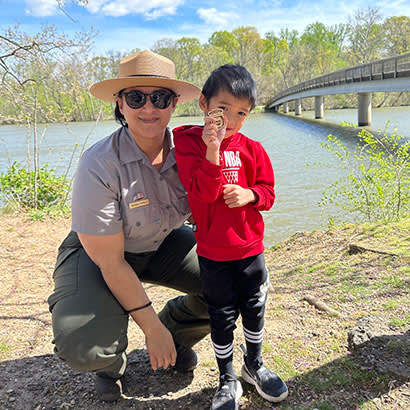
Park and recreation programs have the unique ability to inspire youth and equip them with skills for the future. However, accessibility remains a challenge, particularly for youth with disabilities or those from underinvested communities. To truly empower all young people with a desire to contribute and work in the outdoor sector, it’s critical to address these barriers and create inclusive pathways into outdoor professions.
This blog post explores innovative strategies to make outdoor spaces and training more accessible, ensuring every youth has the opportunity to connect with nature, build valuable skills, and envision a career in the recreation industry.
1. Virtual Training Opportunities for Youth with Disabilities
Challenge: Physical access to parks and training programs can be limited for youth with disabilities.
Solutions:
- Develop online training modules tailored to outdoor workforce skills, such as trail maintenance, interpretation or recreation program planning.
- Use virtual reality (VR) to simulate outdoor experiences, allowing youth to explore scenarios like setting up campsites or conducting environmental surveys. An example of this can be found in a parks and recreation classroom at N.C. State University.
- Partner with organizations like the National Center on Accessibility to adapt programming for virtual learning.
Impact: Youth have the opportunity to gain confidence and foundational knowledge from the comfort of their homes, breaking down initial accessibility barriers.
2. Making In-Person Training More Inclusive
Challenge: Many parks lack infrastructure and adaptive programming to accommodate diverse needs.
Solutions:
- Provide adaptive equipment such as all-terrain wheelchairs, assistive hearing devices or visual aids for outdoor tasks. Tennessee State Parks is setting an incredible example of this.
- Train staff to recognize and address barriers faced by youth with disabilities.
- Offer stipends for transportation and gear to ensure cost isn’t a barrier for participants.
Impact: Inclusive programming ensures all youth, regardless of ability, can engage meaningfully in outdoor spaces.
3. Tailored Workforce Opportunities for Marginalized Youth
Challenge: Marginalized youth often lack access to career-building experiences in parks and recreation.
Solutions:
- Launch mentorship programs connecting youth with professionals who reflect their backgrounds and experiences.
- Design “first job” initiatives that allow youth to ease into the workforce through part-time or seasonal roles.
- Create partnerships with schools and community organizations to recruit underrepresented youth.
Impact: These efforts diversify the future workforce while providing tangible career opportunities for those who may otherwise be overlooked.
4. Integrating Accessibility into Park Design
Challenge: Traditional park infrastructure can limit participation for youth with varying needs.
Solutions:
- Ensure new park projects follow universal design principles, such as barrier-free trails, inclusive play structures, and sensory-friendly spaces.
- Partner with funders to retrofit existing parks with features like ramps, tactile maps, and accessible restrooms.
- Collaborate with local youth to design spaces that meet their specific needs.
Impact: By removing physical barriers, parks become spaces where all youth feel welcome and inspired.
5. Promoting Accessibility through Policy and Funding
Challenge: Limited resources often constrain accessibility initiatives.
Solutions:
- Advocate for policies that prioritize accessibility in outdoor recreation funding.
- Tap into diverse funding sources, such as municipal budgets, federal grants, and private sponsors.
- Highlight success stories to demonstrate the ROI of inclusive workforce programs.
Impact: Sustained funding ensures long-term success and the scalability of accessible programming.
Inspirational Programs Leading the Way
I encourage readers to explore the following youth employment programs around the country that are paving the way for allowing more young people to experience and begin to build a career in recreation and the outdoors.
These initiatives highlight a commitment to youth empowerment by blending workforce development, mentorship, and accessible opportunities within the recreation sector. They serve as strong models for building inclusive programs nationwide.
Creating accessible pathways to the outdoor workforce isn’t just a matter of equity—it’s an investment in the future. By embracing innovative strategies and prioritizing inclusivity, parks and recreation programs can unlock potential in all youth, fostering a workforce that mirrors the diversity of the communities they serve.
Kailey White is the co-founder of the outdoor, military community Military Wild Inc. and current program manager for the Outdoor Explorers for All program with Blue Star Families.
This blog post is part of a multi-part virtual learning series highlighting park and recreation workforce development programs across the country. For more stories like this, check out the following blog posts:


